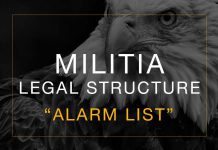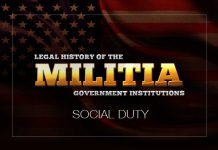“Slave Patrols”
“Slave Patrols”To some, the history of "slave patrols" might suggest that revitalization of “the Militia of the several States” would actually be politically unwise—because...
Slavery and the Militia
Slavery and the MilitiaSlaves throughout the American Colonies were almost always disbarred from the possession of firearms, except under close supervision, no doubt on...
Women and the Militia
Women and Militia Service During the pre-constitutional era women were subject to some Militia duties, if only of a financial nature. And if a...
“Alarm List”
"Alarms" During “alarms”, Rhode Island required all able-bodied free men from sixteen to sixty years of age to muster in defense of their Towns...
Militia: Entrusted with “Police Powers”
“Police Powers”: Entrusted to the Militia as Governmental InstitutionsFrom the earliest days in the American colonies, the Militia were empowered to execute the laws...
“Able-Bodied” and Militia Service
Every “Able-Bodied” Male Between the Ages of 16 to 60 Subject to Some Service in the MilitiaThe general rule for about one hundred fifty...
Trained Bands
Trained BandsThroughout the pre-constitutional period from the mid-1600s to the late 1700s, Rhode Island designated the largest and most active components of her Militia...
Militia: Not Private Associations
Militia: Not in Any Sense Private AssociationsThe original Constitution refers to “the Militia of the several States”, not “the Militia in the several States”. This is because the...
Militia: The Primacy of Social Duty Over Individual Right
Militia: The Primacy of Social Duty Over Individual Right The principle of a universal legal duty for individual militia service persisted even after the Colonists...
“Militia”: What are They?
“Militia”: What are They?To understand the Constitution with respect to the Militia (and everything else it contains, for that matter), Americans must focus on...











































